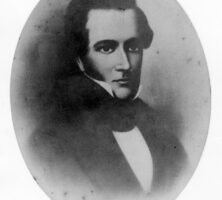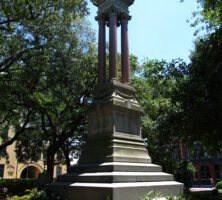Washington Gordon, an accomplished lawyer and public servant, was one of Georgia’s most distinguished citizens. He was also the first president of the Central Railroad and Banking Company (later the Central of Georgia Railway), the corporation that constructed the first rail line connecting the port of Savannah with the cotton-growing interior of the state.
Early Life
William Washington Gordon was born on January 17, 1796, at his father’s plantation in Screven County. He was the son of Elizabeth Meade Gordon and Ambrose Gordon, a New Jersey native. Gordon’s father was a lieutenant of cavalry during the American Revolution (1775-83), serving under Colonel William Washington, a nephew of U.S. president George Washington. Ambrose Gordon settled in Augusta after the war and was granted a large tract of land in recognition of his military services. He and his wife named their eldest son for Ambrose’s commanding officer.

Courtesy of Hargrett Rare Book and Manuscript Library, University of Georgia Libraries.
Upon his father’s death in 1804, young Washington Gordon, then a boy of eight, was sent away to school in Rhode Island. He was appointed a cadet at the U.S. Military Academy at West Point, New York, in 1814 and graduated the following year (the first graduate from Georgia), receiving a brevet as lieutenant in the Ordnance Corps. But the young officer served in the army for less than a year before resigning his commission and returning to Savannah, where he read law under Judge James Moore Wayne.
Family Life and Legal Career
While apprenticed to Judge Wayne, Gordon met the judge’s niece, Sarah Anderson Stites, called “Addy” by her family and friends. The couple married in March 1826 and eventually had four children, whom they raised in the mansion on the corner of Bull Street and South Broad Street (later Oglethorpe Avenue) in Savannah. (The home would later serve as the Girl Scouts museum). The Gordons’ eldest child, George Anderson Gordon, was born in 1830 and became a successful Savannah lawyer. William Washington Gordon II, called “Willie,” served during the Civil War (1861-65) and as a brigadier general during the Spanish-American War (1898). He and Eleanor “Nellie” Kinzie of Chicago, Illinois, were married in 1857 and became the parents of Juliette Gordon Low, the founder of the Girl Scouts.
William Washington Gordon had a successful career at the Georgia bar, to which he was admitted in 1820. He served as legal advisor to the city of Savannah from 1822 to 1824. A dedicated public servant, Gordon belonged to the Georgia Hussars, a renowned cavalry squadron, of which he was captain from 1827 to 1837. In 1833 Gordon was elected an alderman and served until 1836; he also won election to the Georgia legislature, first as a representative in 1835 and then as a senator in 1838. In addition, from 1834 to 1836, he served as the mayor of Savannah.
Railroad Developer
Gordon’s greatest contribution to Georgia was his work with the Central Railroad and Banking Company. The construction of a railroad from Savannah to the interior became crucial to the economy of Georgia in 1833, when South Carolina completed a 136-mile rail line from the port of Charleston to Hamburg, a town directly across the Savannah River from Augusta. This new railroad, the longest in the world at that time, threatened to divert the upland cotton export trade to Charleston. The cotton previously had been transported down the Savannah River from Augusta to Savannah, for export to England and the northern states.
Gordon and his associates were determined to maintain Savannah’s primacy as the port of outlet for Georgia’s principal export. In 1833 the legislature granted charters to three railroad companies, including the Central Railroad and Canal Company of Georgia, which in 1835, after banking powers were granted to railroad companies, became the Central of Georgia Railroad and Banking Company. While in the legislature, Gordon had been a strong supporter of the bill that granted banking privileges to railroads. As an alderman and mayor, he struggled successfully to obtain the initial financing for the railroad.
In March 1836 Gordon was named to the company’s board of directors and appointed its president. The demands of this challenging post led him both to abandon his law practice and to resign as Savannah’s mayor. Gordon labored mightily to bring about the completion of a rail line that would reach the heart of Georgia’s central cotton belt, and construction commenced in late 1836. The financial panic of 1837 was an impediment to progress, but by May 1839 seventy-six miles of track had been laid, and stagecoaches were providing transportation from the end of the line to Macon. Gordon traveled constantly throughout the state, supervising construction, negotiating rights-of-way with planters, and dealing with labor disputes. But he did not live to see the last spike driven in 1843. Worn down by his labors, Gordon died in March 1842 at the age of forty-six.

Image from Ken Lund
Legacy
Honors were heaped upon Gordon following his death. In 1850 Gordon County was created and named in his honor. In 1883 a magnificent cenotaph, constructed in Savannah’s Wright Square by the Central of Georgia Railway, was dedicated as a memorial to Gordon, the company’s first president and longtime leader. One side of the monument bears this description of a great railroad builder: “The pioneer of works of internal improvement in his native State and first President of the Central of Georgia Railroad and Banking Company of Georgia, to which he gave his time, his talents, and finally his life.”








